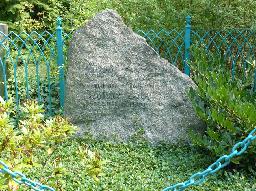Zweig, Arnold |
| WRITER (AUSTRIAN EMPIRE) |
|
BORN 10 Nov 1887, Glogau, Silesia - DIED 26 Nov 1968, Berlin GRAVE LOCATION Berlin: Dorotheenstädtischen Friedhof, Chausseestrasse (CM-1-56 (Ehrengrab, 4. Weg li., li. S.)) |
|
Son of a jewish saddler. He studied at several universities, among them Munich, Berlin, Göttingen and Tübingen. One of his major influences was Nietzsche. His early works "Novellen um Claudia" (1913) and "Ritualmord in Ungarn" made his name known to the public. In 1916 he married his cousin Beatrice Zweig, a painter. They had two sons. Zweig served in the German army as a volunteer during the First World War. He was shocked by the introduction of the Jewish census and he changed from a patriot to a pacifist. After the war he was a zionist. In 1923 he went to Berlin where he became the editor of the "Jüdische Rundschau". During the 1920s he was influenced by Sigmund Freud and underwent his therapy himself. He wrote to Freud in 1927 to ask his permission to dedicate a book to him and the two men corresponded extensively during the next years. In 1929 he attended one of Hitler's speeches and told his wife that he was a Charlie Chaplin without the talent. When Hitler came to power in 1933 he immediately went into exile. He travelled to Czechoslovakia, Switzerland and France before he settled in Palestina. In Haifa he was the publisher of the German newspaper "Orient". During his years in Palestina he turned his back to zionism and became a socialist. In 1948 he was invited by the East German government to return to Germany and so he did. He became a member of parliament and was a member of the cultural advisory board of the communist party. Between 1950 and 1953 he was the president ofg the Germany Academy of Arts. In 1958 he received the Lenin Prize for his anti war novels. After his health started to fail in 1962 he largely withdrew from the public eye. He died in 1968 in Berlin. Related persons • was a friend of Hirsch, Rudolf • was sculpted by Mucchi-Wiegmann, Jenny |
| Images |
Sources • Berlin Dorotheenstädtischen Friedhof, Berlin • Arnold Zweig - Wikipedia (EN) |



